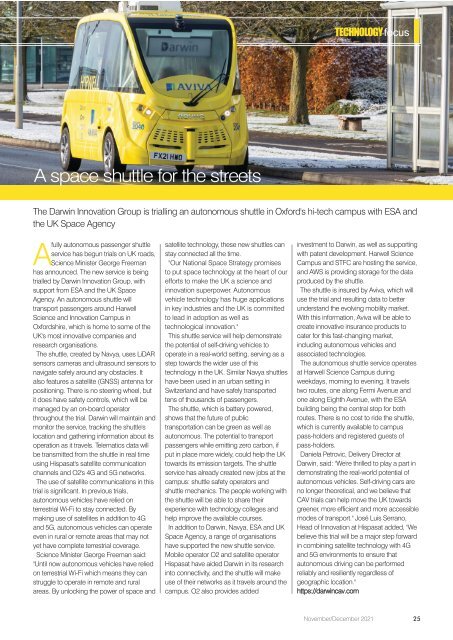CU Nov-Dec 2021
You also want an ePaper? Increase the reach of your titles
YUMPU automatically turns print PDFs into web optimized ePapers that Google loves.
TECHNOLOGYfocus<br />
A space shuttle for the streets<br />
The Darwin Innovation Group is trialling an autonomous shuttle in Oxford's hi-tech campus with ESA and<br />
the UK Space Agency<br />
Afully autonomous passenger shuttle<br />
service has begun trials on UK roads,<br />
Science Minister George Freeman<br />
has announced. The new service is being<br />
trialled by Darwin Innovation Group, with<br />
support from ESA and the UK Space<br />
Agency. An autonomous shuttle will<br />
transport passengers around Harwell<br />
Science and Innovation Campus in<br />
Oxfordshire, which is home to some of the<br />
UK's most innovative companies and<br />
research organisations.<br />
The shuttle, created by Navya, uses LiDAR<br />
sensors cameras and ultrasound sensors to<br />
navigate safely around any obstacles. It<br />
also features a satellite (GNSS) antenna for<br />
positioning. There is no steering wheel, but<br />
it does have safety controls, which will be<br />
managed by an on-board operator<br />
throughout the trial. Darwin will maintain and<br />
monitor the service, tracking the shuttle's<br />
location and gathering information about its<br />
operation as it travels. Telematics data will<br />
be transmitted from the shuttle in real time<br />
using Hispasat's satellite communication<br />
channels and O2's 4G and 5G networks.<br />
The use of satellite communications in this<br />
trial is significant. In previous trials,<br />
autonomous vehicles have relied on<br />
terrestrial Wi-Fi to stay connected. By<br />
making use of satellites in addition to 4G<br />
and 5G, autonomous vehicles can operate<br />
even in rural or remote areas that may not<br />
yet have complete terrestrial coverage.<br />
Science Minister George Freeman said:<br />
"Until now autonomous vehicles have relied<br />
on terrestrial Wi-Fi which means they can<br />
struggle to operate in remote and rural<br />
areas. By unlocking the power of space and<br />
satellite technology, these new shuttles can<br />
stay connected all the time.<br />
"Our National Space Strategy promises<br />
to put space technology at the heart of our<br />
efforts to make the UK a science and<br />
innovation superpower. Autonomous<br />
vehicle technology has huge applications<br />
in key industries and the UK is committed<br />
to lead in adoption as well as<br />
technological innovation."<br />
This shuttle service will help demonstrate<br />
the potential of self-driving vehicles to<br />
operate in a real-world setting, serving as a<br />
step towards the wider use of this<br />
technology in the UK. Similar Navya shuttles<br />
have been used in an urban setting in<br />
Switzerland and have safely transported<br />
tens of thousands of passengers.<br />
The shuttle, which is battery powered,<br />
shows that the future of public<br />
transportation can be green as well as<br />
autonomous. The potential to transport<br />
passengers while emitting zero carbon, if<br />
put in place more widely, could help the UK<br />
towards its emission targets. The shuttle<br />
service has already created new jobs at the<br />
campus: shuttle safety operators and<br />
shuttle mechanics. The people working with<br />
the shuttle will be able to share their<br />
experience with technology colleges and<br />
help improve the available courses.<br />
In addition to Darwin, Navya, ESA and UK<br />
Space Agency, a range of organisations<br />
have supported the new shuttle service.<br />
Mobile operator O2 and satellite operator<br />
Hispasat have aided Darwin in its research<br />
into connectivity, and the shuttle will make<br />
use of their networks as it travels around the<br />
campus. O2 also provides added<br />
investment to Darwin, as well as supporting<br />
with patent development. Harwell Science<br />
Campus and STFC are hosting the service,<br />
and AWS is providing storage for the data<br />
produced by the shuttle.<br />
The shuttle is insured by Aviva, which will<br />
use the trial and resulting data to better<br />
understand the evolving mobility market.<br />
With this information, Aviva will be able to<br />
create innovative insurance products to<br />
cater for this fast-changing market,<br />
including autonomous vehicles and<br />
associated technologies.<br />
The autonomous shuttle service operates<br />
at Harwell Science Campus during<br />
weekdays, morning to evening. It travels<br />
two routes, one along Fermi Avenue and<br />
one along Eighth Avenue, with the ESA<br />
building being the central stop for both<br />
routes. There is no cost to ride the shuttle,<br />
which is currently available to campus<br />
pass-holders and registered guests of<br />
pass-holders.<br />
Daniela Petrovic, Delivery Director at<br />
Darwin, said: "We're thrilled to play a part in<br />
demonstrating the real-world potential of<br />
autonomous vehicles. Self-driving cars are<br />
no longer theoretical, and we believe that<br />
CAV trials can help move the UK towards<br />
greener, more efficient and more accessible<br />
modes of transport." José Luis Serrano,<br />
Head of Innovation at Hispasat added, "We<br />
believe this trial will be a major step forward<br />
in combining satellite technology with 4G<br />
and 5G environments to ensure that<br />
autonomous driving can be performed<br />
reliably and resiliently regardless of<br />
geographic location."<br />
https://darwincav.com<br />
<strong>Nov</strong>ember/<strong>Dec</strong>ember <strong>2021</strong> 25

















